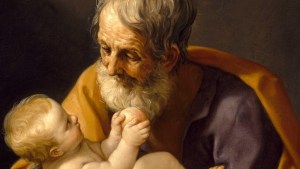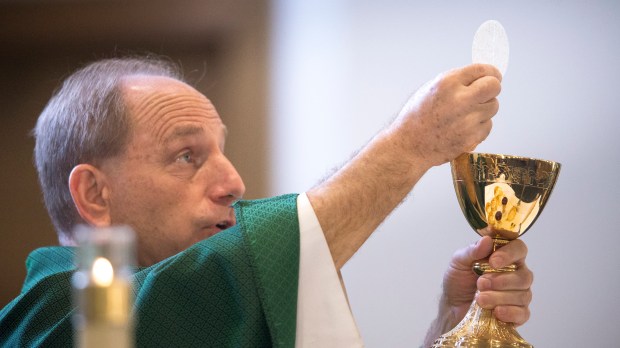When developing the Eucharistic prayer that is said by the priest at Mass, it was decided early on that various saints would be mentioned by name. These included saints such as the Virgin Mary, St. Peter and Paul, the rest of the apostles and a list of Roman martyrs.
However, for many centuries the name of St. Joseph was nowhere to be seen in the Roman Rite.
Why was the foster-father of Jesus omitted from the official canon of Mass?
One of the reasons was because the Church in Rome wanted to highlight the holy example of the martyrs.
The Catholic Encyclopedia explains that, “After Our Lady follow twelve Apostles and twelve martyrs … The twelve martyrs are evidently arranged to balance the Apostles. First come five popes, then a bishop (St. Cyprian), and a deacon (St. Lawrence), then five laymen. All these saints, except St. Cyprian, are local Roman saints, as is natural in what was originally the local Roman Liturgy.”
This doesn’t give a full explanation, but it does give some insight as to why St. Joseph wasn’t included in the Eucharistic prayer. He wasn’t a martyr, so his example was not frequently mentioned during a time when Christians were heavily persecuted by the Roman Empire.
At the same time, St. Joseph was included in various Eastern Liturgies during the first few centuries of the Church.
According to the Life and Glories of St. Joseph, “The ancient hymns of the Greek Church likewise bear witness to the honor paid to St. Joseph. In the time of St. Ignatius, Patriarch of Constantinople, lived that St. Joseph who from his composition of sacred hymns had the surname of the Hymnographer. He states that the feast of St Joseph was celebrated on the Sunday after the Nativity and he gives for that Sunday a canon which concludes thus, ‘Thou, O God-bearing, Joseph wast the guardian of the Virgin, who preserved virginity intact. Be thou with her mindful of us, O Joseph.'”
It took until November 13, 1962 for Pope John XXIII to insert the name of St. Joseph into the first Eucharistic Prayer. Then on May 1, 2013, the Congregation for Divine Worship and the Discipline of the Sacraments promulgated the decree Paternas vices, inserting the name of St. Joseph into Eucharistic Prayers II, III and IV.
With this, the Church is proclaiming what a treasure she has in St. Joseph and is repeatedly lifting him up for all to imitate, as has Pope Francis in his newly declared Year of St. Joseph.

Read more:
Why St. Joseph is a model for contemplative prayer

Read more:
Try the Joseph Rosary

